Knee Replacement
Phase 1 exercises before surgery
Begin these exercises now to build your strength, and keep doing them after surgery. Your case manager or rehab team will tell you when to start phase 2 exercises (about 6 weeks after surgery). Exercise is part of a successful surgery and getting back to normal, everyday living.
It is important to do these exercises on your surgical leg. If you are able, you can do the exercises on both legs.
Do all exercises slowly and with control 2 to 3 times a day. You can increase the number of times as long as it doesn’t hurt too much.
Exercise 1: Ankle pumps
- Sit on a steady chair or lie down.
- Bend your ankle to move 1 foot up and down. Then do the other foot.
- Repeat at least 10 times (for both feet).

Exercise 2: Simple thigh squeezes
- Lie down and bring 1 knee up for support. Keep the kneecap and toes of your straight leg facing the ceiling.
- Pull your toes up toward your head.
- Tighten the muscles in front of your thigh and push the back of your knee into the bed.
- Relax.
- Repeat at least 5 times.

Exercise 3: Harder thigh squeezes
- Lie down and place a firm roll under your knee.
- Straighten your leg, lifting your foot off the bed.
- Hold for a count of 3 to 5.
- Slowly lower your leg.
- Repeat at least 5 times.

Exercise 4: Thigh lifts
Do this exercise only when you can do exercise 2: simple thigh squeezes.
- Lie down and bring 1 knee up for support. With 1 knee in a comfortable position, tighten your thigh muscles and lift your other leg keeping the knee straight.
- Hold for a count of 3 to 5.
- Slowly lower your leg to the bed.
- Repeat at least 5 times.
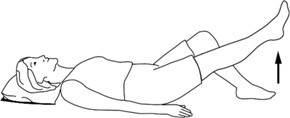
Exercise 5: Knee straightening
- Lie down and bring 1 knee up for support. Keep the kneecap and toes of your straight leg facing the ceiling.
- Place a small roll under 1 ankle and push the knee down toward the bed.
- Hold for a count of 30.
- Relax.
- Repeat at least 5 times.

Exercise 6: Knee bend
- Bend your knee by sliding your heel along the bed toward your buttocks (bum).
- Make sure your knees face the ceiling.
- Hold for a count of 3 to 5.
- Slowly straighten your knee by sliding your heel back to your starting position.
- Repeat at least 5 times.

Exercise 7: Core stability
- Lie or sit with your back supported, bend both knees, and keep your feet flat.
- Tighten your lower stomach muscles by pulling your belly button down towards your spine.
- Squeeze the pelvic muscles that stop the flow of pee. (Ask your physiotherapist to explain how to find these muscles.)
- Breathe normally while holding for a count of 3 to 5.
- Relax.
- Repeat at least 5 times.


Exercise 8: Armchair push-ups
- Sit on a steady chair, with your feet flat on the floor.
- Push up with both arms to lift yourself a few inches off the seat.
- Hold for a count of 3 to 5.
- Slowly lower yourself onto the chair.
- Repeat at least 5 times.
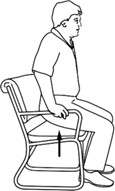
Exercise 9: Sitting knee bends
- Sit on a steady chair with your feet flat on the floor.
- Slowly slide your foot back as far as you can.
- Hold for a count of 3 to 5.
- Slowly slide your foot back to the starting position.
- Repeat at least 5 times.
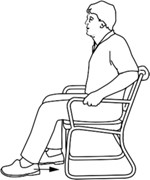
Exercise 10: Sitting knee straightening
- Sit on a steady chair with your thigh supported.
- Lift your foot and straighten your knee.
- Hold for a count of 3 to 5.
- Slowly lower your foot to the floor.
- Repeat at least 5 times.
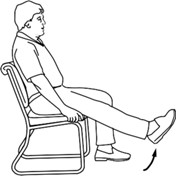
When doing exercises 11 to 14, stand straight, tuck in your stomach, and tighten your buttocks.
Exercise 11: Standing knee bends
- Hold on to a table or counter for support.
- Slowly bend your knee by lifting your heel towards your buttocks.
- Hold for a count of 3 to 5.
- Slowly lower your foot to the floor.
- Repeat at least 5 times.
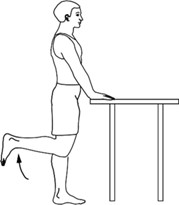
Exercise 12: Standing knee lift
- Hold on to a table or counter for support.
- Lift your knee, as if you were going up a step.
- Hold for a count of 3 to 5.
- Slowly lower your foot to the floor.
- Repeat at least 5 times.
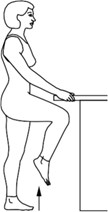
Exercise 13: Mini knee bends (squats)
- Hold on to a table or counter for support.
- Stand with your legs shoulder-width apart and your toes pointed forward.
- Keeping your weight on your heels, slightly bend your knees so you can still see your toes, keeping your heels on the floor and your knees apart. Stick your buttocks back like you are starting to sit down.
- Hold for a count of 3 to 5.
- Slowly return to your starting position.
- Repeat at least 5 times.
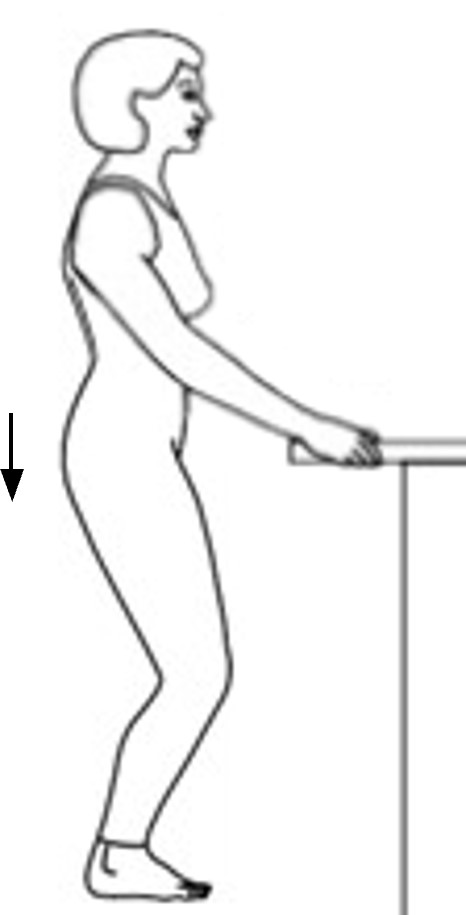
Exercise 14: Heel raises
- Place both hands on a supportive surface for balance.
- Stand with equal weight on both feet.
- Raise both heels off the ground. (Go up on your toes.)
- Lower both heels at the same time slowly.
- Start with 10 repetitions.
- Repeat at least 5 times.
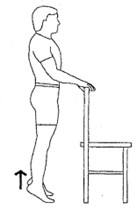
Credit: All images on this page belong to the Bone and Joint Health Strategic Clinical Network, Alberta Health Services.
For more information on physiotherapy services in Alberta, go to Physiotherapy Services.
To see this information online and learn more, visit MyHealth.Alberta.ca/health/aftercareinformation/pages/conditions.aspx?hwid=custom.ab_kneereplacement_phase1_exercise_inst.

For 24/7 nurse advice and general health information call Health Link at 811.
Current as of: October 7, 2025
Author: Bone and Joint Health SCN, Alberta Health Services
This material is not a substitute for the advice of a qualified health professional. This material is intended for general information only and is provided on an "as is", "where is" basis. Although reasonable efforts were made to confirm the accuracy of the information, Alberta Health Services does not make any representation or warranty, express, implied or statutory, as to the accuracy, reliability, completeness, applicability or fitness for a particular purpose of such information. Alberta Health Services expressly disclaims all liability for the use of these materials, and for any claims, actions, demands or suits arising from such use.
